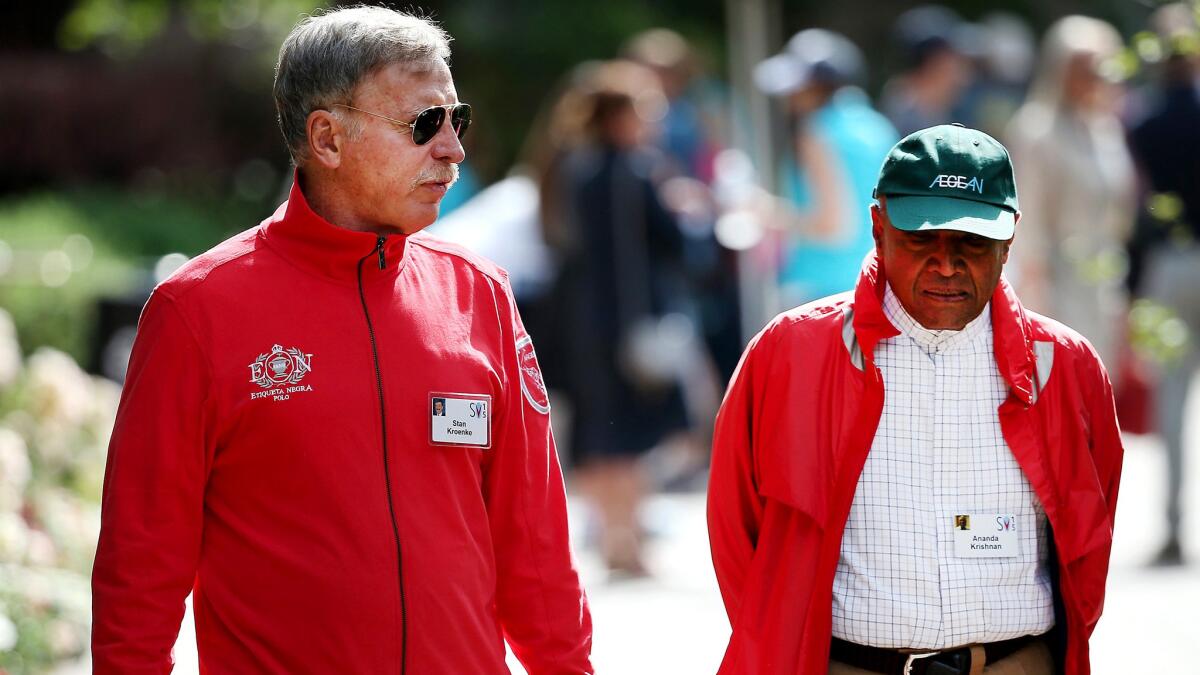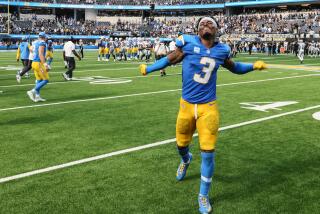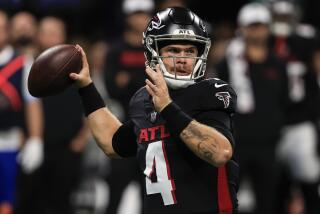San Diego, Oakland, St. Louis converge at NFL owners meeting; L.A. hangs in balance

Rams owner Stan Kroenke, left, chatting with Ananda Krishnan, a Malaysian businessman and philanthropist, during a business conference, is at the forefront of NFL owners’ meetings this week.
- Share via
Reporting from Schaumburg, Ill. — It’s a tale of three cities, a situation steeped in irony.
The St. Louis Rams, San Diego Chargers and Oakland Raiders are elbowing their way down the stretch, angling for the best position to relocate to Los Angeles.
To varying degrees, their home markets are trying to keep them.
Raiders owner Mark Davis seems genuinely tormented about the thought of leaving Oakland . . . but that city has done the least of the three to keep its team.
Chargers owner Dean Spanos has long said he wants to stay in San Diego . . . but 11th-hour efforts to keep his team there could be too little, too late. Now, he’s haunted by the thought of another team moving into the L.A. market while he stays in San Diego with constantly shrinking leverage.
Rams owner Stan Kroenke, who has avoided any public comment about his situation, has given no indication he wants to stay in St. Louis. He’s among the league’s richest owners, he hasn’t asked for a new stadium in St. Louis . . . yet that city has stepped up the most of the three in hopes of keeping its franchise.
That’s the backdrop the league’s 32 owners will ponder as they gather for a special one-day meeting Tuesday at a hotel near Chicago’s O’Hare Airport. It’s a rare interruption from training camps indicating the NFL is more determined than ever to solve the riddle of the two-decade L.A. vacancy.
Kroenke is proposing a stadium in Inglewood. Spanos and Davis have formed an unlikely alliance to back a competing proposal in Carson. At most, only one of the stadiums will be built.
On Monday, officials from the City of San Diego got a chance to make their pitch to the NFL’s Committee on Los Angeles Opportunities, composed of six owners and chaired by Pittsburgh’s Art Rooney II.
While San Diego Mayor Kevin Faulconer and other officials held a simultaneous news conference in that city, unveiling the latest renderings for a new stadium there, a group of his representatives spoke for almost 1 1/2 hours with the NFL committee, as Spanos watched from the back of the room.
San Diego and the Chargers are miles apart in their thinking, and the team isn’t even participating in the stadium process there. The city has cobbled together an environmental impact report [EIR] at hyper-speed, compiling 6,000 pages of studies in a matter of weeks, a process that typically requires a year or longer.
The Chargers say that’s a house of cards, a foundation that won’t survive the legal challenges that are sure to come. And, from the team’s perspective, that’s only part of the problem.
The city wants to get a stadium initiative on the ballot for January, hurrying to comply with the NFL’s desired timetable for a relocation. According to San Diego officials, their polling shows that such a vote would pass — that 51% of the people they surveyed would be comfortable with the city paying one-third of the cost for a $1.1-billion stadium, as long as the money came out of the general fund and not new taxes.
The Chargers scoff at that. First, they argue a stadium would be more expensive than that — their estimate for Carson is $1.7 billion — and they would be responsible for any cost overruns in San Diego. What’s more, they say that survey was conducted by Faulconer’s pollsters, and phrased to produce the most desirable result. The Chargers believed they’d be turned down if public funding for a stadium were put to a vote, and their own polling shows 65% of voters would be opposed to the type of specific funding plan the city is suggesting.
And, from the perspective of Spanos, even if a stadium were to be approved, it could take years for it to become a reality — if it weren’t undone by legal challenges. In the meantime, the Rams could be playing in a new stadium in L.A.
San Diego officials were upbeat after leaving the meeting Monday.
“We talked about conceptual design, we talked about the environmental and construction process, talked about financing concepts,” said Stephen Puetz, Faulconer’s chief of staff. “ We talked about our confidence that we can pass the special election in January. That’s what we’re aiming for.”
The reaction of the committee?
“It seemed very positive to me,” he said.
After those officials left, however, Spanos and others from the Chargers were invited back into the room to answer questions. The committee wanted to know about the San Diego polling, and why the city’s conclusions differ so starkly from those of the Chargers.
George Mihlsten, a highly regarded land-use attorney representing the Chargers, told the committee he has advised Spanos not to participate in any part of the San Diego process. He said that proposal, should it take hold, would be doomed to years of litigation that likely would ultimately derail the stadium.
Said Chargers counsel Mark Fabiani: “We are not going to be part of an EIR process that we believe is fatally flawed.”
The cities of San Diego and St. Louis are expected to make presentations to the entire membership of owners at the October meetings in New York. It’s unlikely Oakland will be invited to present, as the league does not believe that city has put forth a serious proposal.
All sides have their arguments. Three teams, three cities, and one hopelessly tangled L.A. knot cinched tighter by the day.
More to Read
Go beyond the scoreboard
Get the latest on L.A.'s teams in the daily Sports Report newsletter.
You may occasionally receive promotional content from the Los Angeles Times.











